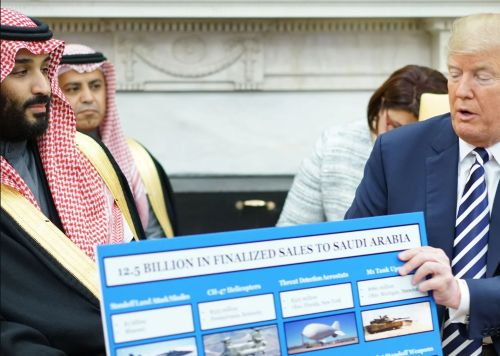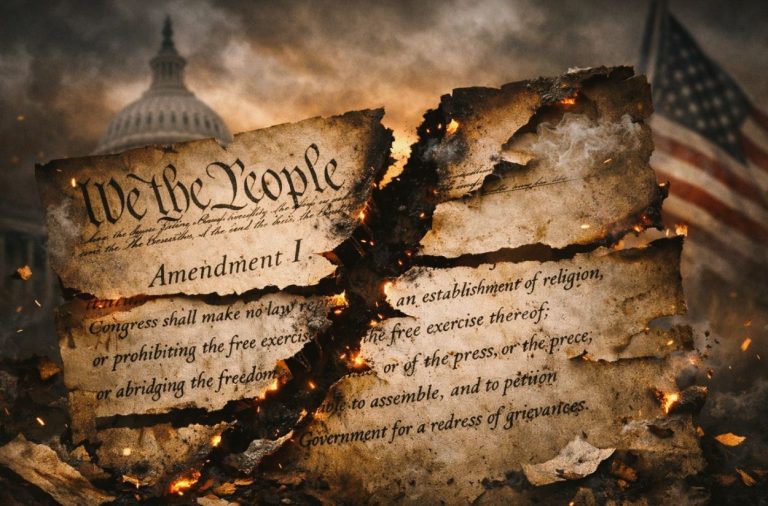

The growing global perception of the U.S. as an arms broker rather than a stabilizing power undermines its claim to leadership.

By Matthew A. McIntosh
Public Historian
Brewminate
Introduction
When President Donald Trump returned to the White House in 2025, one of his earliest and most aggressive policy revivals came in the form of arms deals. From billion-dollar weapon packages for Israel to record-breaking sales to Saudi Arabia, his administration has placed defense exports at the center of American diplomacy. The White House recently sought congressional approval to sell Israel nearly $6 billion in advanced weaponry, a deal framed as bolstering regional security but criticized for deepening the region’s arms race. Earlier in the year, there was a $142 billion weapons agreement with Saudi Arabia during Trump’s May visit to Riyadh, reviving the transactional diplomacy that defined his first term.
Supporters call these deals a demonstration of strength and alliance-building. Critics see something darker: an administration treating foreign policy like an export business, one that blurs the line between national defense and commercial profit. Trump’s approach to international arms trade has made him “the arms dealer in chief,” a title earned through his willingness to prioritize weapons sales over traditional diplomacy.
Behind the soaring figures lies a pattern, a reshaping of American influence not through treaties or aid, but through firepower. Each sale tightens the bond between Washington and regimes with questionable human-rights records, while raising questions about who truly benefits from America’s arsenal: its allies, its defense industry, or its president.
Background: U.S. Arms Policy and the Shift
For decades, U.S. arms exports were framed as instruments of strategy and deterrence, tightly regulated under the Foreign Military Sales program and subject to congressional oversight. Those guardrails, while imperfect, reflected a balance between alliance commitments and ethical restraint. Under President Trump, that balance has shifted dramatically. His administration has made arms sales a central tool of diplomacy, not a policy instrument, but a product line.
The Trump White House is now preparing a sweeping overhaul of U.S. arms-transfer rules, led by Defense Secretary Pete Hegseth, aimed at “streamlining approvals and expanding exports.” The proposal would reduce congressional review periods and shift decision-making toward the executive branch, effectively cutting out one of the few remaining checks on large-scale arms transfers. It echoes the 2018 National Security Presidential Memorandum signed during Trump’s first term, which redefined defense sales as a pillar of economic growth.
This time, the stakes are even higher. The White House has revived the same “America First” rhetoric that once turned foreign policy into a sales pitch for the U.S. defense industry. At a press briefing earlier this year, officials described weapons exports as a way to “create American jobs” and “strengthen allies,” while sidestepping questions about how those weapons might be used. The Department of Defense has been conducting a parallel review to accelerate military procurement and foreign sales, a sign that the administration sees arms trade not as an adjunct to diplomacy, but as diplomacy itself.
Critics warn that this approach erodes both transparency and accountability. It places short-term commercial gain above long-term stability, while inviting ethical and legal scrutiny. But for Trump, arms deals have always been about more than geopolitics; they are a symbol of dominance, measurable in dollars and headlines.
Key Recent Deals as Evidence
The most visible expression of Trump’s arms diplomacy came in May 2025, when the United States and Saudi Arabia announced a weapons agreement worth approximately $142 billion, one of the largest in U.S. history. The deal was signed during Trump’s visit to Riyadh and included advanced air-defense systems, precision munitions, and upgrades to Saudi command networks. The announcement revived the transactional tone of his earlier presidency, where arms sales were celebrated less as security partnerships and more as commercial triumphs.
In September, the administration sought congressional approval to sell Israel nearly $6 billion in U.S. weaponry, including missile interceptors and guided bombs. The proposed transfer was framed as vital to Israel’s defense amid regional volatility, yet human-rights groups warned it would further entrench the ongoing war in Gaza. The administration also authorized the direct shipment of 20,000 assault rifles that had been withheld by the previous administration.
Congressional resistance has been limited. In April 2025, the Senate voted down a measure to block $8.8 billion in weapons sales to Israel. The move signaled that, despite political polarization at home, bipartisan tolerance for large-scale arms exports remains entrenched.
These deals, taken together, illustrate the scope and speed of Trump’s effort to redefine U.S. influence through the global weapons market. From the Middle East to Eastern Europe, the administration has leveraged defense sales as a shorthand for loyalty, a way to turn allies into customers and customers into evidence of American strength.
Political and Strategic Implications
Trump’s renewed arms diplomacy has deepened a long-standing tension between profit and principle in U.S. foreign policy. Supporters within his administration argue that selling weapons to allies strengthens regional deterrence and ensures American defense dominance. But critics contend that the surge in exports has blurred the line between partnership and profiteering, entangling U.S. interests with those of authoritarian governments. Trump’s transactional approach treats arms deals as markers of success rather than instruments of security, prioritizing volume over strategy.
In Israel’s case, the administration has justified new arms transfers as essential to maintaining its “qualitative military edge.” Yet the timing of these deals — amid continued fighting in Gaza and mounting humanitarian crises — has fueled concerns that U.S. policy is underwriting escalation rather than restraint. While the White House emphasized defense, rights organizations argued that U.S. weaponry would likely be used in offensives that risk civilian lives. The contradiction highlights a central feature of Trump’s diplomacy: the rhetorical defense of peace through mechanisms of war.
In Saudi Arabia, the administration has revived one of the most controversial relationships in modern U.S. foreign affairs. The $142 billion sale announced in Riyadh was presented as a mutual economic victory, with Trump boasting that the agreement would “create American jobs” and “solidify alliances.” Al Jazeera and other outlets, however, noted that it marked a dramatic expansion of military support for a monarchy frequently accused of human-rights abuses and regional aggression. The deal underscores the paradox of an “America First” policy that relies on arms exports to nations least aligned with democratic norms.
Domestic politics mirror this divide. Some of Trump’s supporters who previously condemned foreign military aid under Vice President Kamala Harris now praise the same expenditures under his administration, framing them as “strategic investments” rather than “handouts.” Analysts suggest that the discrepancy reflects more than partisanship, it represents a fundamental shift in how American voters interpret strength. Under Trump, military sales are not foreign policy tools to be debated, but symbols of national resurgence to be celebrated.
For the United States’ global standing, the implications are profound. Defense diplomacy has replaced value-based engagement, turning allies into clients and eroding the moral authority that once distinguished American leadership. As Trump accelerates the export of weapons to long-time partners and volatile regimes alike, Washington’s influence increasingly depends on what it sells, not what it stands for, a transformation that could redefine U.S. power long after his presidency ends.
Questions of Accountability and Influence
The scope of Trump’s weapons diplomacy has reignited debate over oversight and transparency in U.S. arms transfers. Under existing law, Congress is meant to review major foreign military sales before approval. But the administration’s proposed overhaul would shorten or bypass those review periods entirely, consolidating control within the executive branch. The move mirrors a pattern from Trump’s first term, when emergency declarations were used to expedite shipments to Saudi Arabia and the United Arab Emirates despite bipartisan opposition. Watchdog groups warn that reducing legislative scrutiny could invite corruption, weaken compliance with human-rights laws, and obscure who profits most from these deals.
Those concerns are amplified by Trump’s long-standing personal and financial ties to the defense sector. Defense contractors have seen rising stock values and expanded government access since his return to office, benefiting from a foreign policy that openly treats arms exports as economic stimulus. The administration has also maintained close contact with major defense executives, who have publicly praised the White House’s “pro-business posture.” While no direct evidence has surfaced of illegal gain, ethics experts argue that the blending of corporate interest and statecraft marks a troubling erosion of boundaries between public policy and private profit.
The effect extends beyond Washington. By prioritizing weapon sales as diplomatic currency, the United States risks encouraging dependency among its clients and resentment among rivals. Accelerated export approvals have fueled regional arms competitions, especially in the Middle East, where allies now measure favor by the speed of U.S. deliveries. For Trump, this system may project power; for the world, it reinforces instability. The president’s insistence on equating diplomacy with defense commerce has turned oversight into an afterthought and accountability into a luxury few can afford.
Conclusion: What It Means for U.S. Foreign Policy and Domestic Politics
Trump’s transformation of arms sales into a centerpiece of diplomacy represents more than a shift in policy; it marks a redefinition of how the United States projects influence. Where earlier administrations balanced strategic aid with moral restraint, Trump’s approach reduces foreign relations to transactional exchange, measured in contracts and shipments. His government has moved faster and more aggressively on defense exports than any in recent history, reshaping alliances through the flow of American weaponry.
Supporters frame this as strength: a pragmatic assertion of U.S. interests after years of what they see as diplomatic weakness. But critics counter that the long-term cost may be the erosion of credibility. When foreign policy becomes indistinguishable from commerce, the nation’s power risks becoming conditional, dependent on what it sells rather than what it stands for. The growing global perception of the U.S. as an arms broker rather than a stabilizing power complicates its claim to leadership in conflicts where human rights and restraint are at stake.
Whether this trajectory endures beyond Trump’s presidency will depend on how deeply it becomes embedded in the machinery of government. If Congress fails to reclaim oversight, and if future administrations inherit this model of “weapons-first diplomacy,” the United States may find itself locked into a system where every alliance carries a price tag and every act of diplomacy begins with a sale. For now, Trump’s legacy on the global stage may best be summed up by the label his critics have given him, not Commander-in-Chief, but the Arms Dealer-in-Chief.
Originally published by Brewminate, 11.06.2025, under the terms of a Creative Commons Attribution-NonCommercial-NoDerivatives 4.0 International license.


